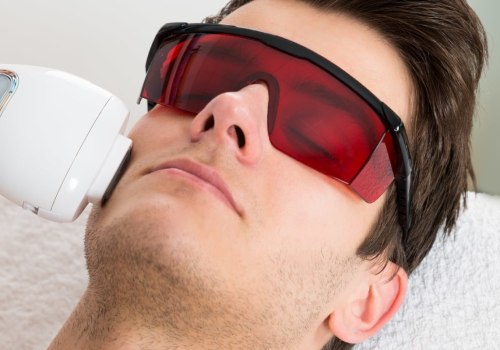Laser hair removal is a popular cosmetic procedure that offers long-term solutions to unwanted hair, making it a convenient alternative to traditional methods like shaving, waxing, or plucking. The treatment works by using laser energy to target and damage hair follicles, inhibiting future growth. While laser hair removal can be effective for many people, certain factors such as skin tone, hair color, and hair thickness can influence how well the treatment works. Understanding who laser hair removal works best for can help you determine whether it's the right option for you.
The Role of Hair Color in Laser Hair Removal
Laser hair removal is most effective for individuals with dark hair and light skin. This is because the laser targets the pigment (melanin) in the hair follicles, and darker hair contains more melanin. The higher concentration of melanin allows the laser to more effectively absorb the light and heat, which damages the hair follicle and prevents it from regrowing.
People with black or dark brown hair tend to see the best results from laser hair removal treatments. Their hair follicles absorb the laser's energy more efficiently, leading to quicker and more noticeable hair reduction. Those with light brown hair may also achieve good results, though the number of treatments may need to be adjusted depending on the hair's thickness and density.
However, laser hair removal is less effective for individuals with lighter hair colors such as blonde, gray, or red hair. These hair types contain less melanin, which makes it more difficult for the laser to target the follicles. In such cases, alternative methods of hair removal might be recommended, or specialized lasers designed for lighter hair may be used, although results can still vary.
The Importance of Skin Tone
Skin tone plays a significant role in determining how successful laser hair removal will be. Traditionally, the procedure has worked best on individuals with lighter skin tones because the contrast between their skin and dark hair allows the laser to effectively target the hair follicle without affecting the surrounding skin.
For those with darker skin tones, the challenge is that the laser may have difficulty distinguishing between the pigment in the hair and the pigment in the skin. This can lead to skin irritation or even burns if the wrong type of laser is used. However, advancements in laser technology have made it possible for people with darker skin to benefit from laser hair removal. Lasers with longer wavelengths, such as Nd
lasers, are now available and are designed to safely treat individuals with darker skin tones by bypassing the pigment in the skin and directly targeting the hair follicles.
Hair Thickness and Density
Another factor that affects the success of laser hair removal is the thickness and density of the hair being treated. Coarser, thicker hair responds better to laser treatment because it contains more melanin, which allows the laser to target it more effectively. Areas of the body where hair tends to be coarser—such as the underarms, legs, and bikini line—often show faster and more dramatic results.
For individuals with finer or thinner hair, laser hair removal may still be effective, but it may require more sessions to achieve the desired results. The laser has a harder time targeting thin or light-colored hair follicles, so multiple treatments may be necessary to ensure that all follicles are sufficiently damaged to prevent regrowth.
Treatment Frequency and Patience
Laser hair removal requires multiple sessions for optimal results, and this applies to everyone, regardless of skin tone or hair type. Hair grows in cycles, and laser hair removal is only effective during the growth phase. Since not all hairs are in the growth phase at the same time, several treatments spaced a few weeks apart are necessary to target all of the hair follicles.
For most people, six to eight sessions are required to achieve the desired level of hair reduction. However, individuals with lighter hair or darker skin may need additional treatments. It's important to be patient and follow the recommended treatment schedule to see the best results over time.
Ideal Candidates for Laser Hair Removal
The ideal candidate for laser hair removal is someone with light skin and dark hair, as this combination allows the laser to easily target the hair follicles without affecting the surrounding skin. However, thanks to advances in laser technology, many people with different skin tones and hair types can still achieve significant hair reduction results.
For individuals with dark skin, working with a clinic that offers lasers specifically designed for their skin type is essential to ensure safe and effective treatment. Additionally, people with finer or lighter-colored hair may still benefit from laser hair removal, but they should be aware that it may take more sessions and careful treatment to achieve the best possible results.
Personalized Treatments for Best Results
Because laser hair removal works differently for each person depending on their skin tone, hair color, and hair type, it's essential to seek treatment at a reputable clinic with experience in customizing laser hair removal plans. Clinics like Solve Clinics (https://solveclinics.com/) offer personalized consultations to determine the most effective laser settings and treatment plan for each individual, ensuring that you receive the best care for your specific needs.
Conclusion
Laser hair removal works best for individuals with dark hair and light skin, but advances in laser technology have made it accessible to people with a broader range of skin tones and hair types. While those with darker skin or lighter hair may need specialized treatments, the procedure can still offer long-lasting results. Factors such as hair thickness, density, and patience throughout the treatment process are important considerations for anyone seeking laser hair removal. By working with an experienced clinic and understanding your unique needs, you can achieve smooth, hair-free skin with minimal hassle.










